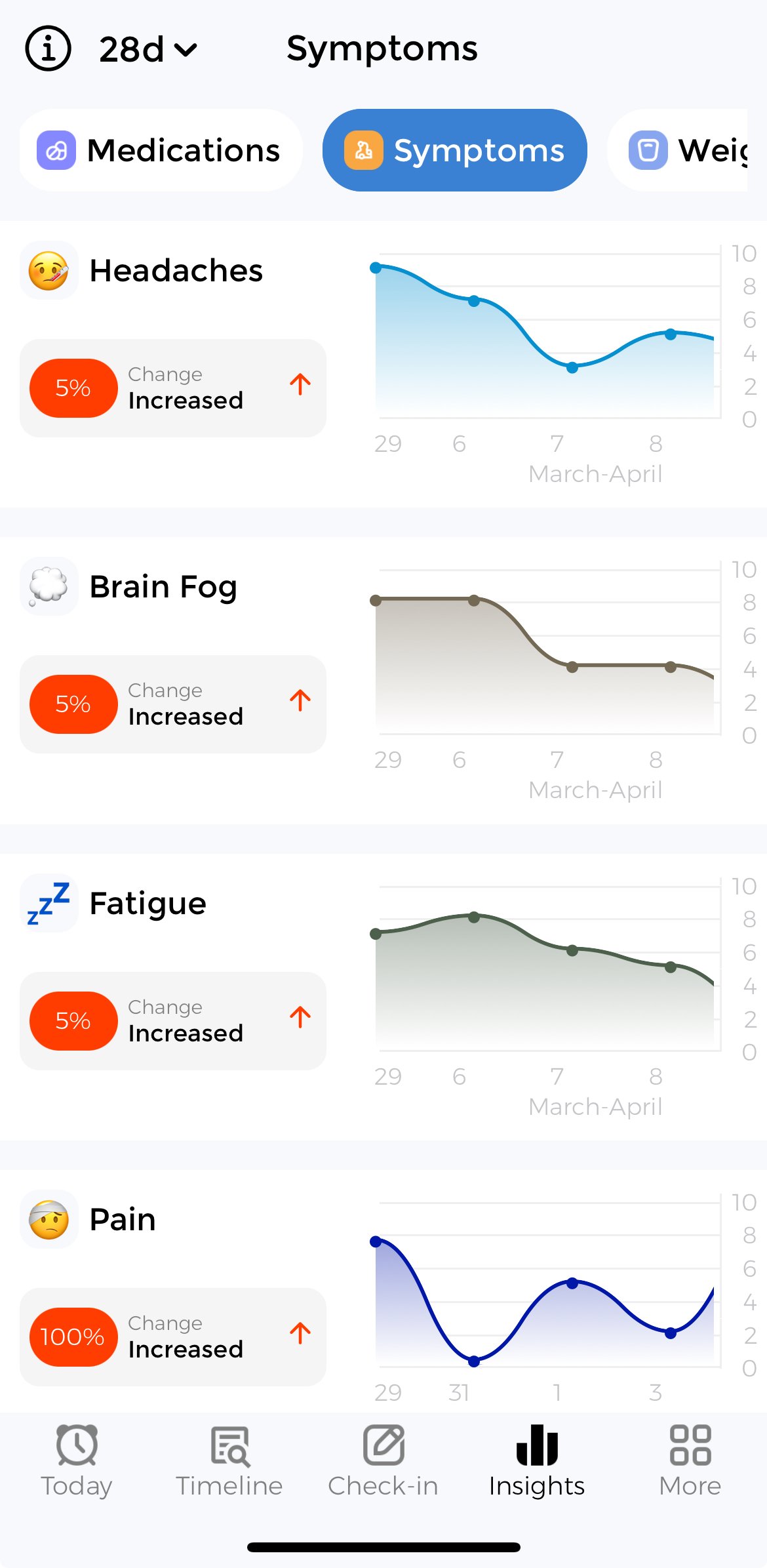

Trying to make sense of your decreased range of motion? With CareClinic, you can track symptoms, lifestyle factors, and triggers like Allergens — giving you the clarity you need to manage and improve your health daily.
Stop guessing about your health. Track your symptoms to uncover data-driven insights you and your clinician can use to spot patterns, measure progress, and make better decisions.
Track what triggers your decreased range of motion such as stress, anxiety, lack of sleep.
Identifying your specific triggers can help you avoid or minimize them in your daily routine.
Frustrated that over-the-counter pain relievers, rest, and hydration aren't working consistently for your decreased range of motion? Tracking reveals what's actually helping.
Consistent tracking provides objective data about treatment effectiveness, helping you and your healthcare provider make informed decisions.
Tired of not being taken seriously by doctors? Bring data, not just complaints, about your decreased range of motion to get the care you deserve.
Without tracking:
Doctor: "It's probably just stress. Let's wait and see."
With CareClinic tracking:
Doctor: "These patterns are concerning. Let's run some tests to investigate further."
Analysis of symptom patterns shows these factors are strongly associated with decreased range of motion occurrence. Tracking these triggers alongside your symptoms can help identify personal patterns and correlations.
Data source: De-identified observational data from 2,392 consenting research participants who provided informed consent for anonymized data contribution upon enrollment. Insights regarding symptom patterns, triggers, and demographics were derived from this consented cohort in accordance with research ethics protocols.
You've probably tried everything. Medications. Journals. Doctors. Avoiding your favorite foods. And still, the decreased range of motion keeps coming back. Maybe someone told you it's just stress. Maybe you were rushed out of an appointment in under 7 minutes. Maybe you started believing that nothing could fix it. The problem isn't you. The problem is you've never had a way to connect the dots — until now.
Answer a few questions to better understand your symptoms and identify possible related conditions.
The CareClinic app lets you track and manage your decreased range of motion with comprehensive tools. Take complete control of your health with powerful tracking features designed for effective symptom management.
Cohort analysis based on patient-reported observational data from consented research participants
Patients reporting decreased range of motion also frequently experience these related conditions, suggesting shared underlying mechanisms or diagnostic overlap. Understanding these associations can help facilitate more informed healthcare conversations.
Arthritis refers to inflammation of one or more joints, causing pain, stiffness, and decreased range of motion. Tracking...
Our comprehensive tracking tools provide everything you need to monitor, understand, and manage your decreased range of motion.
Track severity, duration, location, and other characteristics of your decreased range of motion with easy-to-use tools.
Identify potential triggers by connecting your decreased range of motion to factors like sleep, diet, stress, and activity.
Never miss tracking with customizable reminders that help you maintain consistent records.
Generate detailed reports to share with healthcare providers for more informed discussions about your decreased range of motion.
🎁 Includes: Guided check-ins, trigger discovery paths, and direct export to PDF for doctors.

Visualize your progress, identify patterns, and see how lifestyle changes impact your symptoms over time.
The CareClinic app helps you visualize your decreased range of motion severity over time, allowing you to:
The app automatically identifies patterns in your decreased range of motion, showing you which days, times, or activities are associated with symptom changes.
Discover which triggers have the strongest impact on your decreased range of motion with our correlation analysis. Focus on the factors that matter most.
For the top treatments, users with decreased range of motion reported:
Compare how different treatments affect your decreased range of motion over time. Find what works best for your unique situation.
Identify patterns between decreased range of motion and changes in: Sleep, HRV, Steps, Heart Rate, Resting Heart Rate, Weight, Blood Pressure, and more.

Apple Health

Google Fit
Stop suffering in silence. Join the thousands who've taken control of their health journey.
| Problem | What Most People Do | What Smart People Use |
|---|---|---|
| Decreased Range Of Motion | Ignore, Google symptoms, worry | CareClinic Symptom Tracker |
| Doctor Visits | Forget details, feel dismissed | CareClinic Appointment Records |
| Treatment Effectiveness | Guess, waste time & money | CareClinic Reports |
| Finding Triggers | Trial & error, months of frustration | CareClinic Insights |
Your doctor's memory isn't perfect. But your data can be.
Record your decreased range of motion in seconds. Rate severity, note location, and track duration effortlessly.
Uncover connections between your decreased range of motion, medications, foods, stress, and more.
Generate detailed reports for your healthcare providers with one click. Get taken seriously.
Catch worsening patterns early. Stop minor symptoms from becoming major health issues.
CareClinic helps cut that down. Way down.
Free to start. Advanced features available for power users.
Thousands of people use CareClinic to track their decreased range of motion and take control.
Since I started tracking my decreased range of motion with CareClinic, I've identified my triggers and reduced episodes by 60%. My doctor was impressed with the detailed reports.
The correlation features helped me discover that my decreased range of motion worsens after certain foods. Making small changes based on the data has made a huge difference.
As a nurse, I recommend CareClinic to my patients with chronic decreased range of motion. The detailed data helps their doctors make more informed treatment decisions.
CareClinic is the premier symptom tracking app available on iOS, Android, and Web, helping thousands of people feel more in control of their chronic mental and physical health conditions each year. CareClinic is recommended by leading health platforms including WebMD, Healthline, the National Science Foundation, Harvard University, and healthcare professionals worldwide.
Over 500,000 CareClinic members have used the app to identify triggers, track changes in symptom severity, and share detailed health data with doctors to aid with diagnosis and treatment. It's not just a free symptom tracker app – it's also the best health companion for anyone hoping to take control of every aspect of their physical and mental wellbeing.
CareClinic is recommended by leading healthcare organizations and professionals for managing decreased range of motion and other chronic conditions.
"CareClinic's symptom tracking tools provide patients with valuable insights that can lead to more productive healthcare visits and better treatment outcomes."

Start tracking today to generate your own personalized insights and charts.
Get Your Personalized Results